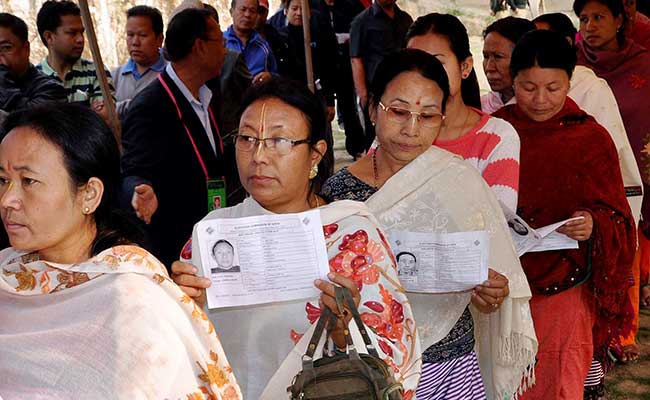UP, Manipur, Register Higher Voter Turnout Than 2012
 NEW DELHI : Nearly 57 per cent voting took place till 5 pm in eastern Uttar Pradesh’s 49 assembly seats that went to polls in the sixth phase today. The number was higher than last time but much lower than Manipur which voted for 38 of its 60 seats in the first of two phases today, registering an 84 per cent turnout.
NEW DELHI : Nearly 57 per cent voting took place till 5 pm in eastern Uttar Pradesh’s 49 assembly seats that went to polls in the sixth phase today. The number was higher than last time but much lower than Manipur which voted for 38 of its 60 seats in the first of two phases today, registering an 84 per cent turnout.
The north-eastern state is voting in the middle of an economic blockade that Prime Minister Narendra Modi has pledged to end if the BJP comes to power in the state and concerns about a possible Naga accord. But it is the seven-phase election in the country’s most populous state – where Chief Minister Akhilesh Yadav is trying to get a second term for himself in alliance with the Congress – that has been the focus of much attention.
The ruling Samajwadi Party had won 27 of the 49 seats where voting was held today. This time, the party led by Chief Minister Akhilesh Yadav is fighting the election in alliance with the Congress spearheaded by Rahul Gandhi.
Mulayam Singh, 77, has been very selective, mostly absent from Samajwadi Party’s campaign in Uttar Pradesh ever since his son, the 43-year-old first time chief minister, wrested control of the party after a bitter family feud. Mr Singh has not attended even a single public meeting in Azamgarh.
Star candidates fighting the polls today included Swami Prasad Maurya, Mayawati’s key aide who switched over to the BJP ahead of polls. Voting was also held today in Union Minister Kalraj Mishra’s parliamentary constituency Deoria and Yogi Adityanath’s Gorakhpur.
Ahead of the last phase of voting in UP on March 8, Varanasi played host to Prime Minister Narendra Modi, Chief Minister Akhilesh Yadav, Congress Vice President Rahul Gandhi and Bahujan Samaj Party Chief Mayawati who led high-octane campaigns.
Heavy security arrangements have been made in Manipur, especially at the two highways connecting to Imphal and others states amid a blockade by key Naga groups led. 280 companies of central paramilitary forces and armed police of other states stood guard as voting began at 7 am. Over 69 per cent turnout was recorded till 1 pm.
Violent clashes triggered in Manipur after Congress Chief Minister Okram Ibobi Singh bifurcated seven of the state’s nine districts – mostly hills where the Nagas are in majority. Naga groups have since blocked highways and supply lines to cripple state’s transportation. Union Minister Kiren Rijiju has called it “handiwork of the chief minister”.
The BJP campaign so far in Manipur – including rallies by PM Modi and Amit Shah’s door-to-door groundwork – has challenged Chief Minister Okram Ibobi Singh-led Congress rule of 15 years. There have been bitter exchanges between the Congress and the BJP over the ongoing economic blockade and the Naga Peace Accord. Rahul Gandhi has also addressed multiple rallies in the state.
Prominent candidates in the first phase include state Speaker Th Lokeswar Singh, ministers I Hemochandra Singh, Govindas Konthoujam, Kh Ratankumar Singh and T Manga Vaiphei.
Irom Sharmila, who ended an iconic 16-year-long fast in August, is debuting in politics by contesting from Thoubal constituency in Manipur. Elections for the 403 seats in Uttar Pradesh are being held in seven rounds and in two rounds in Manipur. Voting in both states end on March 8 and the results will be announced on March 11.

